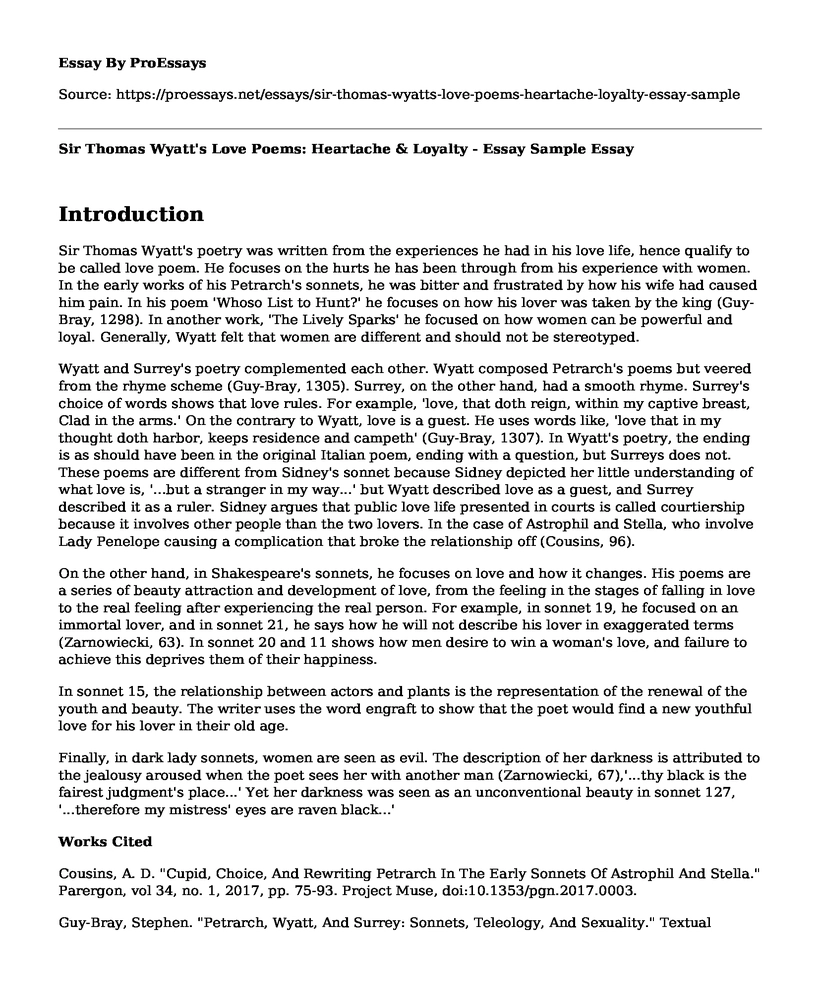Introduction
Sir Thomas Wyatt's poetry was written from the experiences he had in his love life, hence qualify to be called love poem. He focuses on the hurts he has been through from his experience with women. In the early works of his Petrarch's sonnets, he was bitter and frustrated by how his wife had caused him pain. In his poem 'Whoso List to Hunt?' he focuses on how his lover was taken by the king (Guy-Bray, 1298). In another work, 'The Lively Sparks' he focused on how women can be powerful and loyal. Generally, Wyatt felt that women are different and should not be stereotyped.
Wyatt and Surrey's poetry complemented each other. Wyatt composed Petrarch's poems but veered from the rhyme scheme (Guy-Bray, 1305). Surrey, on the other hand, had a smooth rhyme. Surrey's choice of words shows that love rules. For example, 'love, that doth reign, within my captive breast, Clad in the arms.' On the contrary to Wyatt, love is a guest. He uses words like, 'love that in my thought doth harbor, keeps residence and campeth' (Guy-Bray, 1307). In Wyatt's poetry, the ending is as should have been in the original Italian poem, ending with a question, but Surreys does not. These poems are different from Sidney's sonnet because Sidney depicted her little understanding of what love is, '...but a stranger in my way...' but Wyatt described love as a guest, and Surrey described it as a ruler. Sidney argues that public love life presented in courts is called courtiership because it involves other people than the two lovers. In the case of Astrophil and Stella, who involve Lady Penelope causing a complication that broke the relationship off (Cousins, 96).
On the other hand, in Shakespeare's sonnets, he focuses on love and how it changes. His poems are a series of beauty attraction and development of love, from the feeling in the stages of falling in love to the real feeling after experiencing the real person. For example, in sonnet 19, he focused on an immortal lover, and in sonnet 21, he says how he will not describe his lover in exaggerated terms (Zarnowiecki, 63). In sonnet 20 and 11 shows how men desire to win a woman's love, and failure to achieve this deprives them of their happiness.
In sonnet 15, the relationship between actors and plants is the representation of the renewal of the youth and beauty. The writer uses the word engraft to show that the poet would find a new youthful love for his lover in their old age.
Finally, in dark lady sonnets, women are seen as evil. The description of her darkness is attributed to the jealousy aroused when the poet sees her with another man (Zarnowiecki, 67),'...thy black is the fairest judgment's place...' Yet her darkness was seen as an unconventional beauty in sonnet 127, '...therefore my mistress' eyes are raven black...'
Works Cited
Cousins, A. D. "Cupid, Choice, And Rewriting Petrarch In The Early Sonnets Of Astrophil And Stella." Parergon, vol 34, no. 1, 2017, pp. 75-93. Project Muse, doi:10.1353/pgn.2017.0003.
Guy-Bray, Stephen. "Petrarch, Wyatt, And Surrey: Sonnets, Teleology, And Sexuality." Textual Practice, vol 33, no. 8, 2019, pp. 1297-1309. Informa UK Limited, doi:10.1080/0950236x.2019.1648095.
Zarnowiecki, Matthew. "Responses to Responses to Shakespeare'S Sonnets: More Sonnets." Critical Survey, vol 28, no. 2, 2016, pp. 45-67. Berghahn Books, doi:10.3167/cs.2016.280203.
Cite this page
Sir Thomas Wyatt's Love Poems: Heartache & Loyalty - Essay Sample. (2023, Jun 09). Retrieved from https://proessays.net/essays/sir-thomas-wyatts-love-poems-heartache-loyalty-essay-sample
If you are the original author of this essay and no longer wish to have it published on the ProEssays website, please click below to request its removal:
- Essay on Dreams and Aspirations in A Raisin in the Sun
- On the Road by Jack Kerouac: Critical Essay
- Literary Analysis Essay Sample on "The Things They Carried"
- Research Paper on Medea Mythology
- Drama Soundtrack in Fences Play
- Essay Sample on Creature in Frankenstein: Excluded and Abominated?
- Uncovering the Universe's Greater Truth - Essay Sample







